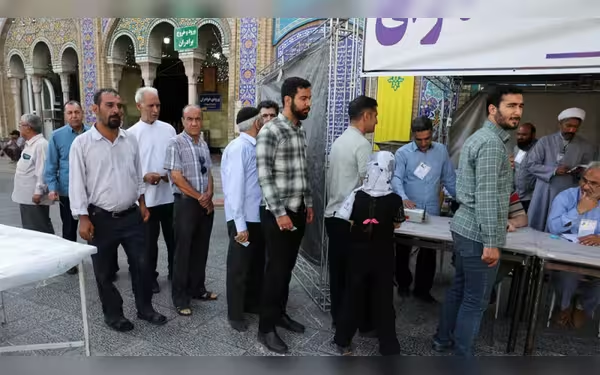Tuesday, July 2, 2024 03:42 PM
Iran's Presidential Election: Pezeshkian vs. Conservative Front
- Reformist candidate Masoud Pezeshkian challenges conservative contenders in Iran's election.
- Supreme Leader Khamenei emphasizes active voter participation for Iran's electoral process.
- Debates among candidates cover critical issues like the 2015 nuclear agreement and women's rights.
 Image Credits: brecorder
Image Credits: brecorderIran's presidential election features reformist candidate Masoud Pezeshkian challenging a fragmented conservative front. Supreme Leader Khamenei stresses voter participation as candidates debate critical issues like the nuclear agreement and women's rights.
Iran recently conducted its presidential election following the tragic demise of President Ebrahim Raisi in a helicopter crash. The current electoral landscape features reformist candidate Masoud Pezeshkian, aged 69, contending for victory against a fragmented conservative front, which includes contenders Mohammad Bagher Ghalibaf and Saeed Jalili. Notably, the Guardian Council authorized Pezeshkian's candidacy subsequent to the withdrawal of two ultraconservative candidates.
Supreme Leader Ayatollah Ali Khamenei urged Iranian citizens to participate actively in the electoral process, underscoring the significance of a substantial voter turnout. Against the backdrop of heightened regional tensions involving Israel and the US, polling stations were operational nationwide. Anticipated results are slated for release by Sunday, with a potential runoff scheduled for July 5 in the absence of any candidate securing a majority of 50% of the vote.
The emergence of Pezeshkian as a candidate has revitalized aspirations within Iran's reformist movement. Former President Mohammad Khatami has thrown his support behind Pezeshkian, lauding his integrity. Khamenei has emphasized the necessity of a leader dedicated to upholding Iran's revolutionary principles and safeguarding its independence from external influences.
During the electoral campaign, candidates engaged in debates encompassing critical issues such as the 2015 nuclear agreement. Jalili expressed reservations about the accord, while Pezeshkian advocated for its reinstatement to alleviate economic sanctions. Furthermore, the discourse extended to the contentious topic of mandatory head coverings for women, with candidates collectively condemning stringent enforcement practices.
The ongoing presidential election in Iran has captured global attention due to the unexpected circumstances surrounding the candidacy of Masoud Pezeshkian and the broader implications for the country's political trajectory. As the electoral process unfolds, the Iranian populace eagerly awaits the outcome, which could potentially shape the nation's domestic and international policies in the coming years.













